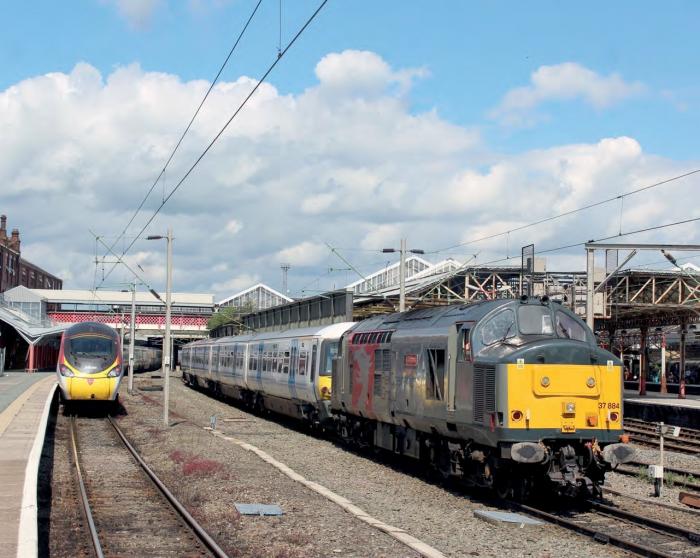Informed Sources
Now OLR is the ROSCO of last resort


On 12 November 1992, the Chancellor of the Exchequer’s Autumn Statement included a change in the rules which had prevented government bodies, like British Rail, leasing stuff. Up till then, the Treasury had regarded leasing as coming under its External Finance Limits (EFL). Exploiting these relaxed rules, and partly in an attempt to encourage development of a leasing market in the run-up to privatisation, British Rail was given authority to lease rolling stock worth £150 million in the years 1994-95 and 1995-96.
As it was explained to me at the time, by none-other than Rail Minister Roger Freeman himself, lease payments would fall outside the EFL because the financial risk would stay with the leasing organisation, which would own the rolling stock.
Keep that rationale in mind. What followed was the ‘Informed Sources’ version of EastEnders. Throughout 1993, almost every month brought a new plot twist.
Remember, in 1993 BR was fighting its way through a recession which would see passenger miles fall to the lowest level since Bob Reid had launched the business-led railway. Simultaneously, management was getting to grips with the implications of the privatisation White Paper published in October 1992.
So a fiddly leasing deal for a handful of new trains was not high on the BR agenda. As John Nelson, who had taken over Network SouthEast from Chris Green, told me, if there was £150 million available, his spending priority was life-expired signalling.
KITTENS OF ‘93
Then, as now, there were also the industrial and political imperatives of avoiding factory closures. Throughout 1992 the Railway Industry Association had been highlighting the lack of new rolling stock orders.
Most vulnerable was ABB Transportation’s (formerly BREL) York plant, which would have nothing to build after its current contract for Networkers was completed.
With Chris Green’s Class 471 Kent replacement fleet a distant dream, the obvious application for the £150 million was ABB’s notional Class 371 dual-voltage Networker. But you couldn’t just give the contract to ABB. There had to be competition.
After some prodding, BR’s InterCity business responded with a proposal for a small batch of InterCity 225s for the West Coast main line. The lobbying included a run to Manchester promoting the ‘IC225 Experience’.
MIFFED
But when the prices came in IC225 was unaffordable and the money went to the new dual-voltage Networker, now Class 465/3. A final twist was the award of the traction equipment to GEC Alsthom, which left Brush, which had equipped the previous ABB/BREL Networkers, miffed. A cynical observer might have noted that York Works got a reprieve while GEC Alsthom at Preston won a much more profitable order than a few Class 91 traction packages (I assume you did – Ed).
Anyway, the deal was signed in October 1993 and British Railways Board entered into two complex finance leases with the banks for what would be the Class 365s. But when the rolling stock companies (ROSCOs) were privatised in November 1995, the Class 365s were the odd fleet out, because BR didn’t own them.
A Special Purpose Vehicle (SPV) was set up with the sole business of leasing the Class 365 fleet. In effect, Eversholt became the lessee in place of BR and then sub-leased the Class 365s to a train operating company. Revenue from the sub-lease was used to pay the lease rentals due to the owners.
GUARANTEE
Now, remember that bit about financial risk staying with the leasing organisation? Do you really think banks are that naïve? Of course not.
Somewhere in the small print was a clause guaranteeing that if the trains weren’t needed before the lease expired in 2022, the Government would buy out the head lease. And with 19 units in store, and no immediate prospect of a new operator, Eversholt was unable to make the head lease payment for 2019.
As a result, owner RBS Bank called in the Government guarantee, and DfT has bought back the entire Class 365 fleet. But what does a government department do when it finds it has 40 dual-voltage EMUs on its hands? Why, call in Robin Gisby, Chairman of its Operator of Last Resort. Mr Gisby set up Train Fleet (2019) Ltd and now we have a ROSCO of last resort.
This is not necessarily an embarrassment, since it means that DfT now has a strategic reserve of versatile EMUs compliant with Persons with Reduced Mobility rules that it can allocate to any train operating company in need. The official DfT line is that any TOC with a business case can submit a proposal. I suspect a simple ‘Mayday, Mayday’ call may suffice come the new year.
